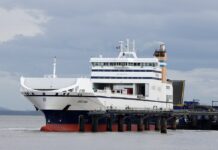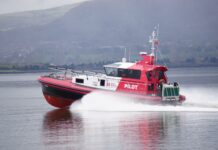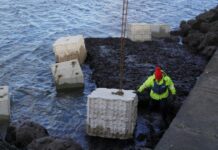Anticipated chaos on the border and at ports on the day after Brexit didn’t quite materialise, with no major delays reported, although that was more down to less volumes because of the Christmas break.
However, with freight traffic likely to increase over the coming days and weeks, new technology and new controls will be fully put to the test, with some disruption likely.
Stena Line and Irish Ferries are operating full ferry services between Holyhead and Dublin, which has become the busiest Irish Sea crossing for trade between the Republic of Ireland and Britain.
On the first day after Brexit, some lorries were stopped from boarding ferries at Holyhead because they did not have the correct paperwork.
The Irish Minister for Transport Eamon Ryan says State agencies “have been able to tease out” problems. “It will be a pain in the neck for the companies because there is a huge amount of background bureaucratic forms, procedures to be filled out, but once we get used to that I don’t believe it will be disruptive to our own everyday life.”
Meanwhile, Stena Line has added an additional freight-only vessel to its Rosslare to Cherbourg route which with become an increasingly important freight link between Ireland and the Continent. The Stena Foreteller has joined the Stena Horizon which already operates
UK Ports have also seen little disruption so far. At Dover, for example, traffic has remained light but free-flowing.
However, it was a different story there in the run up to Christmas, not because of Brexit, but because of the rapid spread of a new Covid-19 variant which resulted in France closing its borders for two days.
Urgent Review
Now, Logistics UK has written to the government to request an urgent review of traffic management and welfare arrangements for HGV drivers in the wake of chaos.
 In a letter to transport minister Lord Agnew, Logistics UK has pointed to shortcomings in the government’s plans in the event of any future Brexit related border disruption, like that at Christmas which led to chaos on roads in Kent and left thousands of drivers stranded without access to basic hygiene and food provision facilities.
In a letter to transport minister Lord Agnew, Logistics UK has pointed to shortcomings in the government’s plans in the event of any future Brexit related border disruption, like that at Christmas which led to chaos on roads in Kent and left thousands of drivers stranded without access to basic hygiene and food provision facilities.
Says Elizabeth de Jong, Policy Director at Logistics UK: “That drivers should have to spend two days at the side of the road, without adequate toilet facilities or the immediate provision of hot food, was a national embarrassment.”
She adds: “It is vital that arrangements are fast tracked so that any drivers facing similar delays because of new customs procedures are able to access the facilities they need.
“With new customs procedures in place from 1 January 2021, it is vital that all the systems needed to support hauliers as they move across our borders are in full working order. The industry will need regular, nationwide real-time information feeds from the government on the status of all ports, combined with early insight where traffic is building – this will highlight where problems are likely to occur and help delays to be mitigated.”















